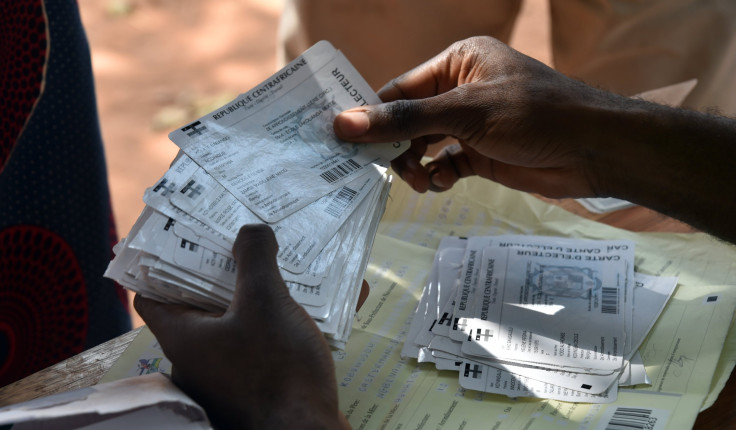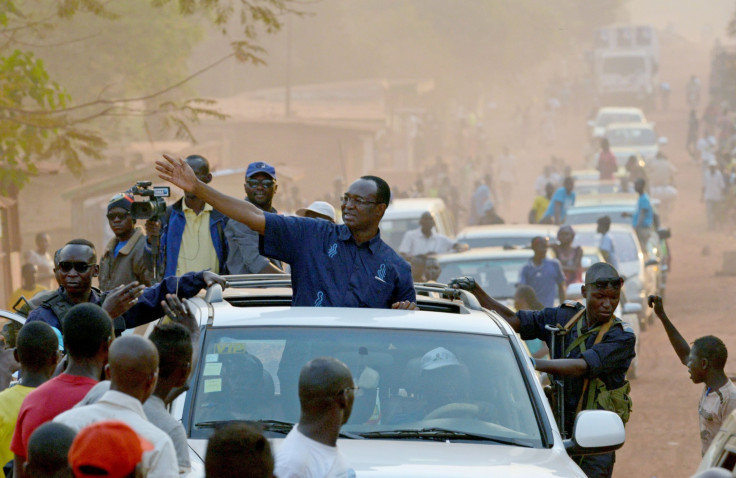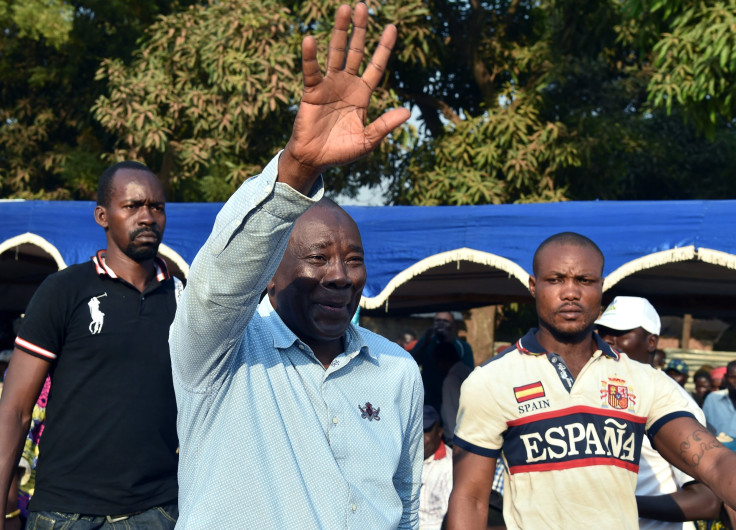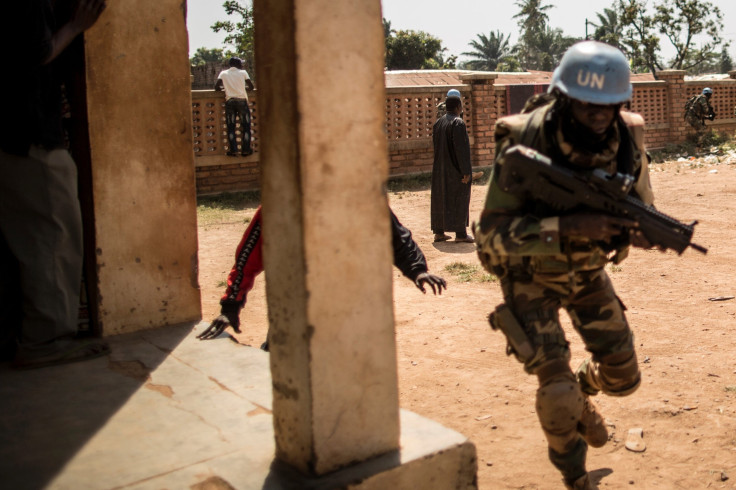Central African Republic Elections 2015: Guide To Candidates, Issues, Voting Process And Poll Results

The Central African Republic is set to hold landmark presidential and legislative elections Wednesday, hoping to turn the page on years of sectarian violence between Christians and Muslims. Dates for the polls have been repeatedly scheduled and missed due to violence and a lack of organization, as the clock ticks on the transitional government leading the war-torn country.
Free and fair elections are key to resolving the ongoing conflict, but the volatile climate isn't hospitable for a peaceful and successful voting process. Armed groups still thrive in large swaths of the country and thousands of Central Africans are displaced. If the long-delayed elections go on as planned and a candidate is chosen from dozens of presidential hopefuls, political experts said the new government will have to work fast to disarm militias and renew national dialogue in order to unite the country and revive a sagging economy.
"If elections do go forward, they will be far from perfect," said Christopher Day, assistant professor of political science and African studies at the College of Charleston in South Carolina. "Elections are a structural incentive for the country to get its political house in order, but it's impractical given the state of ongoing violence and impunity."
The Central African Republic has been enmeshed in a deadly conflict since late 2012, when mainly Muslim groups formed an alliance known as Seleka and seized power in a coup from President François Bozizé. The Seleka eventually ceded power amid international pressure to form a transitional government, which was tasked with steering the nation to elections this week. However, the conflict opened a security vacuum and triggered the current wave of revenge attacks by Christian militias, leading to a vicious tit-for-tat cycle of sectarian violence. Some 400,000 people have fled their homes in Seleka-controlled areas, while another 460,000 have sought refuge in neighboring countries.
Despite the sparring sides signing a ceasefire agreement in 2014, violent clashes persist. Christian militias in Bangui have cut off the tiny PK5 neighborhood, one of the most dangerous districts, from the rest of the capital city for the past few months by blocking supplies from entering and Muslims from leaving.

The Candidates
There are 30 candidates vying for the presidency, including sons of former rulers. One of the front-runners is former Prime Minister Anicet Georges Dologuélé. Dologuélé, who founded the Central African Union for Renewal political party, became widely known as “Mr. Clean” for his efforts to clear out theft and corruption. The first-time presidential candidate is backed by the KNK, the political faction of Bozizé, who has been barred from running. Dologuélé’s election campaign boasts his peaceful past and good record on cleaning up public finances.
"At age 58, I have never held a weapon," he said recently. "I am still happy to recall that between 1996 until now, the only time there were no military or political crises in the country was during my time in office," Dologuélé also said, according to Agence France-Presse.
Dologuélé was president of the Development Bank of Central African States for several years, a post that experts say makes him one of the more credible candidates at leading the country out of a political and economic crisis. "No one has ever implicated him in any coups or attempted coups or militias," said J. Peter Pham, director of the Africa Center at the Atlantic Council, a Washington think tank.
Martin Ziguélé is also a favorite to win the presidential poll. This is Ziguélé’s third time running for president and he thought to be the candidate of choice for the country’s former colonial ruler, France. Ziguélé, 58, served as premier under former President Ange-Felix Patassé and launched an anti-corruption campaign to clean up the government’s accounts. He went into exile in France when Bozizé seized power in a coup in 2003. The trained economist who hails from Patassé's onetime ruling MLPC party is a fierce opponent of Bozizé. He has pledged to restore state authority and crack down on impunity, according to BBC News.
"He is a pretty experienced politician. He knows how to play politics in his own country," said Day, who met with Ziguélé during a trip to the Central African Republic in July. "But he seems to at least understand that there's a big gap between elites in Bangui and the rest of the country."

Abdoul Karim Meckassoua is considered the top Muslim minority candidate, according to DW news agency. The presidential candidate has from a constituency in Bangui, which includes the mostly Muslim PK5 district, and is drawing immense support from the religious minority population. About 80 percent of the impoverished nation’s population is Christian, while roughly 15 percent is Muslim.
Meckassoua, 62, held several ministerial portfolios under Bozizé and remains one of the rebel ruler's close allies. He is widely known for his diplomatic skills and was instrumental in reaching a rapprochement between Patassé and Bozizé, who toppled the former president. Meckassoua told AFP he hopes to bring together warring Christians and Muslims
"Everyone speaks about unity and development, but I'm not necessarily convinced that many of them are actually good candidates for delivering that," Pham warned.
Jean-Serge Bokassa, the son of former self-proclaimed emperor Jean-Bedel Bokassa, is a first-time candidate for president. Also running is Patassé's son, Eugene Sylvain Ngakoutou Patassé, who has no political experience. Both candidates are likely running with the hope of amassing support through their family name, political experts said.
Key Issues
The transitional government and regional peacekeepers have struggled to halt fighting and disarm militias. Violence against Central African civilians occurs almost daily in what the United Nations considers a "critical" human rights situation. Most recently, at least three people were killed in Bangui following a grenade attack Monday, two days before voting is scheduled to take place, according to Bloomberg News.
Whoever wins the presidential election must immediately push a disarmament and demobilization program before renewing national dialogue between the warring factions. But even then, political analysts warned that a ceasefire and peace talks won't solve the crisis overnight. There are an estimated tens of thousands of fighters in the country and the Muslim minority population has long felt marginalized. Government officials must also address the representation gap of the Muslim minorities by diversifying recruitment within the public administration.
"I'm concerned that the international community has already made up its mind that these elections, no matter how flawed, are good enough," Pham said.
Once a stable ceasefire is established, state authority restored and a reconciliation process is underway, the newly elected government can begin reviving the economy, which has suffered as a result of the ongoing conflict, observers said. The Central African Republic saw a 36 percent drop in its gross domestic product in 2013. The economy has slowly clawed back, but the agricultural sector — the chief contributor to GDP — continues to struggle.
Farmers are afraid to go out to their fields, marketplaces are vacant and Muslim-Christian trade is virtually nonexistent. Almost 70 percent of the population lives in poverty and many residents rely on humanitarian food aid. The government should tap into the country's wealth in mineral resources and raw materials, experts said. The Central African Republic may be one of the poorest nations in the world, but it is rich in uranium, diamonds, gold and timber, among other things.

The Voting Process
If no single presidential candidate wins an outright majority Wednesday, a second round of voting is scheduled for Jan. 16. With armed groups still operating freely in parts of the country, violence might disturb Wednesday's vote as it has several times in the past, in which case the elections would be delayed once again. The Dec. 27 election was previously slated for Dec. 24.
“Elections may still be interrupted,” Lewis Mudge, a researcher with Human Rights Watch’s Africa Division, wrote in an op-ed Saturday.
The election comes on the heels of a Dec. 13 referendum that saw a resounding 93 percent vote in favor of a new constitution to limit future presidents to two terms in office and cut the power of the military. Almost 2 million out of 4.8 million citizens had registered to vote, but turnout was low at 38 percent and the constitutional referendum was marred by violence, according to VOA News.
Election Results
Political experts suspected voter turnout to be low given the ongoing violence and large number of displaced persons. Still, results could take days to trickle in because the Central African Republic is still new to the electoral process. Since gaining independence from France in 1960, the country has seen six republics, an empire and several transitional governments. It held its first open elections in 1993.
© Copyright IBTimes 2024. All rights reserved.





















